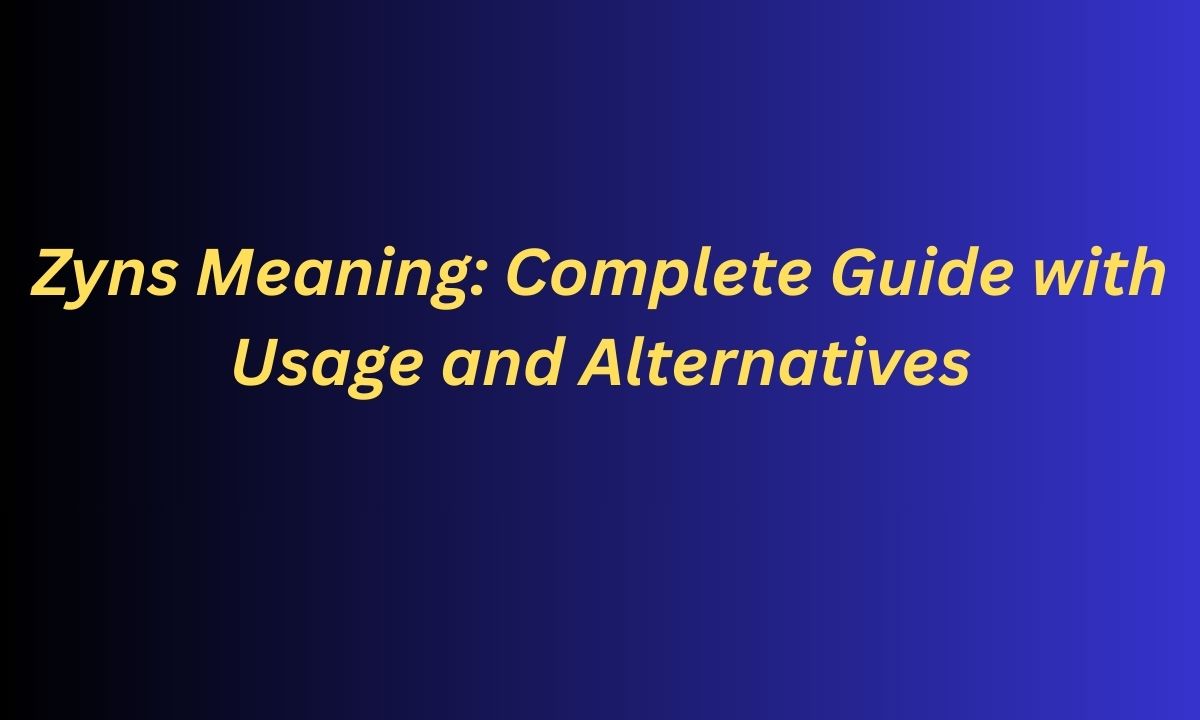The phrase “zyns meaning” has become a topic of curiosity for many readers exploring online discussions, text messages, and evolving slang. Words and abbreviations often carry different shades of meaning, making it essential to understand their context clearly.
In digital spaces, particularly social platforms, unique words or stylized forms like zyns emerge frequently. People often encounter them in conversations, captions, or even brand contexts, leading to the need for a reliable explanation.
This article will provide a comprehensive exploration of zyns meaning. It will break down its significance in text, explain possible uses, and also introduce polite, professional, and casual alternatives—helping readers choose the right expression for any context.
Understanding “Zyns Meaning”
When discussing “zyns meaning”, it is essential to recognize that zyns is not a standard English word found in dictionaries. Instead, it often appears in modern slang, online interactions, or as part of product branding. Because of this, its meaning can shift depending on where it is used.
In informal contexts, zyns may stand for shorthand expressions, initials, or playful abbreviations. For example, in text messages, users often create variations of existing words to give conversations a casual and unique touch. This means zyns could function as a stylistic substitute rather than a traditional word.
At the same time, zyns may also appear in professional discussions where the term might be linked to a brand name or product. This dual nature—slang in casual communication and a label in formal settings—makes its meaning versatile and dependent on the speaker’s or writer’s intent.
Zyns Meaning in Text
When someone asks about “zyns meaning” in text, they are usually referring to how the word appears in digital communication, such as SMS, chats, or social media posts. Here, zyns often conveys creativity, identity, or shorthand for a concept that only makes sense within a particular group.
Text messages thrive on brevity, so abbreviations and shortened terms like zyns flourish. For instance, friends may use it as an inside joke, code word, or unique spelling that represents a certain phrase. Its meaning, therefore, is rarely universal—it depends on context, relationships, and shared understanding.
In essence, when analyzing zyns meaning in text, readers should pay attention to tone, audience, and setting. What appears as an unfamiliar word to one person may carry an affectionate, casual, or brand-related message to another.
Why Meanings Like “Zyns” Matter
Words such as zyns represent how language constantly adapts. Online and offline, people invent and share expressions that reflect their culture, humor, or communication style. These creations reveal the flexibility of English and its ability to evolve with every generation.
Just like terms such as hiatus that have been reimagined in modern communication, zyns captures the playful and adaptive nature of words. It reminds us that meanings do not remain fixed—they grow with trends, shared experiences, and contexts.
Understanding terms like zyns allows readers not only to interpret text accurately but also to connect meaningfully with people who use them. It prevents misunderstandings while adding depth to how we respond in casual or professional conversations.
Exploring Alternatives to the Phrase
Often, people look for alternatives to expressions like zyns or hiatus. Depending on tone, audience, and purpose, choosing the right alternative ensures clarity and appropriateness. Below are three main styles of alternatives: polite, professional, and casual.
- Polite Alternatives: These help maintain respect and warmth while avoiding slang.
- Professional Alternatives: These are clear, formal, and suited for workplace communication.
- Casual Alternatives: These bring ease and informality, matching relaxed conversations.
The following sections provide detailed examples with explanations.
15 Examples of Alternatives with Context
Here are 15 alternatives to expressions like zyns or hiatus. Each is explained with context and best use:
- Break – Simple and clear, suitable for both casual and professional situations.
- Pause – Gentle and polite, perfect when you want to slow down without finality.
- Intermission – Works in formal writing or events, often associated with performances.
- Rest – Casual and caring, commonly used in friendly or supportive contexts.
- Interval – More formal, often applied in academic or structured discussions.
- Time off – Professional, especially in workplace or scheduling conversations.
- Breather – Informal and casual, typically used among friends.
- Recess – Polite and suitable for group or educational settings.
- Suspension – Stronger in tone, often used in business or official contexts.
- Respite – Professional and sophisticated, great for polished writing.
- Downtime – Casual and modern, common in tech or business talk.
- Hiatus – The classic choice, formal yet widely understood.
- Pause in progress – Professional and descriptive, clarifies ongoing work.
- Temporary stop – Neutral and polite, works in all settings.
- Interlude – Stylish and literary, fitting for creative or expressive writing.
Each alternative reflects tone and intent. Choosing one depends on whether the situation calls for warmth, professionalism, or informality.
Choosing the Right Alternative
Selecting the right alternative to zyns or hiatus depends on three key factors: audience, purpose, and medium.
- Audience: Talking to colleagues demands professional terms like time off or respite, while speaking with friends makes breather or downtime more fitting.
- Purpose: If the goal is formal communication, terms such as intermission or interval should be used. For relaxed chats, rest or pause work better.
- Medium: Emails, academic papers, or social media captions each require different tones—professional, formal, or casual.
By considering these factors, individuals can avoid miscommunication and present themselves more effectively.
Nuances of Tone in Alternatives
Each word carries subtle connotations. For example, respite feels more sophisticated and empathetic, while downtime signals informality and modern style. Similarly, suspension sounds authoritative and official, unlike breather, which is light and friendly.
Tone is not just about word choice but also about how the phrase fits into the overall message. In a business proposal, a formal word can add credibility. In personal chats, a casual expression creates intimacy and comfort.
Being sensitive to tone allows a speaker or writer to match their intentions with audience expectations. This skill is especially valuable in professional environments where impression and clarity are vital.
How “Zyns Meaning” Connects to Language Evolution
The emergence of expressions like zyns reflects how English constantly borrows, adapts, and reinvents itself. From historical shifts to internet slang, language thrives on creativity. Zyns may not be universally defined, but it embodies innovation in communication.
Much like hiatus has broadened from academic use to everyday slang, zyns demonstrates how unfamiliar words gain recognition through repeated digital use. As communities adopt and spread them, they become part of living language.
This fluidity ensures English remains responsive to cultural shifts and personal creativity. Instead of being rigid, it evolves with human interaction.
Practical Tips for Using Alternatives
- Match tone with audience – Always consider whether the reader expects formality or informality.
- Avoid overuse of slang – While playful, slang like zyns can cause confusion in professional settings.
- Balance creativity with clarity – Be original, but ensure the meaning is still understandable.
- Observe context – If others use casual terms, mirror their style. If the setting is formal, lean toward professional vocabulary.
- Stay updated – New slang and expressions emerge constantly; being aware of trends helps in interpreting or using them effectively.
By following these tips, speakers and writers can communicate clearly without losing personality or respect.
Conclusion
The exploration of “zyns meaning” reveals how words develop, shift, and thrive in different contexts. Whether in text, slang, or branding, zyns demonstrates the creative flexibility of language. Its meaning varies, but its presence highlights the importance of adapting communication styles.
Polite, professional, and casual alternatives offer readers a toolkit for effective expression. From pause to respite or downtime, each word provides nuance and clarity depending on audience and tone. Ultimately, understanding terms like zyns enhances connection and ensures communication remains engaging, respectful, and clear.

Elizabeth crafts heartfelt messages for every occasion—anniversary wishes, love notes, prayers, thank-yous, and inspirational greetings—bringing warmth, joy, and connection to your special moments.










